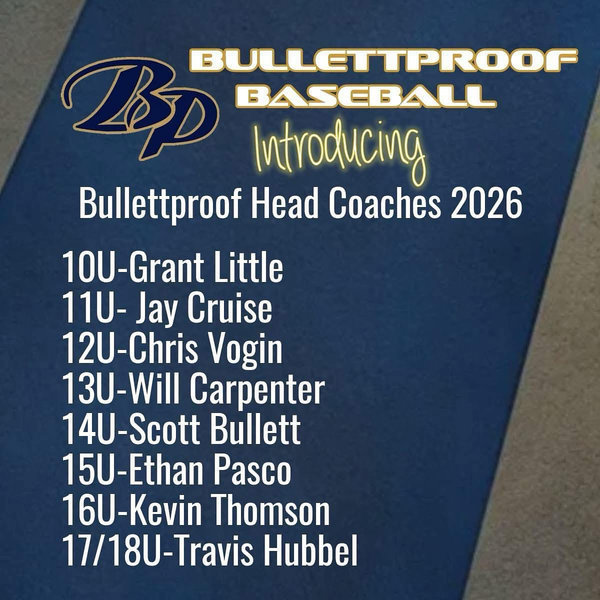Bullett Proof Baseball Academy
1100 Niagara Street
Welland, Ontario, L3C 1M6
Our goal at Bullett Proof Baseball Academy is to help provide each and every player with an opportunity to find a College/University that fits his educational and athletic needs. Our objective at Bullett Proof Baseball Academy is to provide each and every player with the tools that will set them apart, from the rest. While Bullett Proof Baseball Academy greatly increases your chance of recruitment, in the end, your academic and on-field performance will be the final factors.
NCAA Baseball – National Collegiate Athletic Association:
NCAA baseball has three divisions – NCAA division 1, 2 and 3. All of these schools are 4 year universities and colleges and offer a variety of academic programs and degrees.
NCAA division 1 baseball is very competitive and often attracts the best baseball players in Canada and the United States.
Division 1 and 2 offers scholarships but it is allowed only 11.7 full scholarships per team. Therefore many players get only a part scholarship and very few get all of their education paid for – (tuition and room and board).
Players interested in playing NCAA (Div. 1 or 2) must register in the NCAA Clearinghouse in order to be eligible to play in the NCAA. The NCAA clearing house is an organization that determines whether or not the athlete has the required academics in order to enroll and compete in an NCAA school. They will review SAT or ACT scores of the athlete. It is recommended that student athletes register with the NCAA Clearinghouse in their third year of high school. A student athlete must be registered in the NCAA Clearinghouse before receiving any type of scholarship or competing in the NCAA.
Division 3 baseball often does not have athletic scholarships but may offer academic scholarships.
The NCAA College World Series for division 1 is held in Omaha, Nebraska every spring. Division 2 and division 3 will also host a championship College World Series.
NAIA – National Association of Intercollegiate Athletics:
This association is affiliated with various 4 year schools in the United States and one university in Canada (University of British Columbia).
Players interested in playing NAIA must register in the NAIA Eligibility Center in order to be eligible to play in the NAIA. The NAIA Eligibility Center is an organization that determines whether or not the athlete has the required academics in order to enroll and compete at an NAIA school. They will review SAT or ACT scores of the athlete. It is recommended that student athletes register with the NAIA Eligibility Center in their third year of high school. A student athlete must be registered in the NAIA Eligibility Center before receiving any type of scholarship or competing in the NAIA.
Most of these schools offer athletic and academic scholarships and a variety of 4 year degrees. The schools will often have smaller enrolments than the larger NCAA division 1 schools which might be benefit for many student athletes. The level of play at many schools is similar to NCAA division 2 and often these schools will schedule division 2 schools in the spring.
The NAIA World Series is hosted in Lewiston, Idaho annually in late May.
NJCAA – National Junior Collegiate Athletic Association:
The NJCAA offers academics for 2 year degrees or courses offering training in fields where players can transfer to 4 year schools as players continue with their academic interest and two more years of college baseball. Student athletes are able to achieve Associated Arts degree that is transferable to a 4 year school. There are advantages of playing junior college baseball as these schools often play a fall and a spring schedule and have less restrictions on when and how often they can practice and play. Also players may be able to step in and play right away as this is a two year program and competing for a spot on the roster may be easier. However, having to transfer to another school and adapting to a new school and baseball program may be a deterrent for some student athletes.
There are differnt divisions of junior college baseball -NJCAA division 1,2 and 3. California junior colleges compete within their own state in the California Community College Association. Washington and Oregon compete within the Northwest Athletic Association of Colleges – or NWAAC. Douglas College in British Columbia competes in the NWAAC.
The NJCAA will host a championship college world series for all divisions.
CIBA - Canadian Intercollegiate Baseball Association:
There are teams in the Atlantic Provinces, Quebec, and Ontario. This league plays in the fall and has a CIBA championship. Universities such as Brock University, McGill University, Western University, University of New Brunswick and University of Ottawa participate in CIBA.
CCBC - Canadian College Baseball Conference:
consists of teams from British Columbia and Alberta such as Prairie Baseball Academy, University of Calgary, Thompson River University, Kwantlen Polytechnic, Vancouver Island Baseball Institute, and Okanagan University. These teams have a fall and spring schedule with a championship held in May. The CCBC
Helpful Suggestions for Interested Student Athletes:
· Draft a letter that describes your desire to play college baseball, list your capabilities such as your 60yd dash, catcher pop times, radar gun etc., season stats, and awards you have received;
· Attend Showcase / Prospect camps – often schools offer showcase / prospect camps that you can attend;
· SAT / ACT Tests – get these done ASAP – contact your high school guidance counselor for this information;
· Contact the US border and inquire about a student visa and paperwork involved. It is referred to as the I-20 form.
Important Websites:
www.ncaa.org or www.ncaa.com - info on the NCAA
http://web1.ncaa.org/ECWR2/NCAA_EMS/NCAA.jsp - NCAA Clearinghouse.
- NCAA Division 1 baseball.http://www.d1baseball.com/schools/
http://www.stmarytx.edu/athletics/ncaa/index.php?id=bb– NCAA Division 2 baseball.
http://www.d3baseball.com/landing/index- NCAA Division 3 baseball.
www.naia.org- info on NAIA.
http://www.naia.org/ViewArticle.dbml?DB_OEM_ID=27900&ATCLID=205323044– NAIA Schools.
– NAIA Guide for College Bound Studentshttp://www.naia.org/fls/27900/1NAIA/membership/NAIA_GuidefortheCollegeBoundStudent.pdf?DB_OEM_ID=27900
http://www.playnaia.org/?ATCLID=205322931&SPSID=647589&SPID=100441&DB_LANG=C&DB_OEM_ID=27900– info on the NAIA Eligibility Center
www.njcaa.org – information on the National Junior College Association of Intercollegiate Athletics.
http://www.cccaasports.org/baseball/men/- California Junior College.
www.ciba-abic.org– information Canadian Intercollegiate Baseball Association.
http://sat.collegeboard.org/home- Essential information related to practicing, and writing SATs.
http://store.collegeboard.com/sto/productdetail.do?Itemkey=008525– official SAT study guide.
http://sat.collegeboard.org/practice/sat-practice-test- SAT practice test.
http://www.actstudent.org/- Essential information related to practicing, and writing ACTs.
Choosing a School and Some Questions to Consider:
Baseball Questions:
- What types of scholarships does your school typically grant?
- Academic?
- Athletic (note typically NCAA Div. 3 schools don’t offer athletic, but some find a way)?
- Academic?
1.Are you prepared to go that far from home?
Question to self:
- Can first-year students have cars on campus?
- What is the fee for a parking permit?
- Do I need to get a new driver’s license if I’m from out-of-state?
- Do you offer any airport or other regular shuttles?
- Where do I open a bank account?
- Where do I collect mail?
- How do my parents, family and friends send packages?
Other Services (On-Campus):
- Where is the dining hall?
- What are the hours of service?
- What meal plan options are available?
- How do I pay for the meal plan?
:Meal Plan
- Are laundry facilities available?
- Are there computer and phone hookups in all the rooms?
- Will I need to bring my own computer?
- If I don't own a computer, are there computer labs available?
- Do you have 24-hour labs? Are they located in or near student housing?
- Are there computer support services on campus?
Services and Facilities:
- Are roommates assigned or can I choose my roommate?
- How do you assign roommates?
- If I have a problem with my roommate, who can I talk to about the problem?
- Can I change roommates in the middle of the semester?
Roommates:
- When do freshman move in?
- When does upper classmen move in?
- Do most students live on campus or commute?
- Do you require that students live on campus for a certain time period? (Some require students to live on campus for the first year or two.)
- Will I be guaranteed on-campus housing?
- Do the dorms close over breaks? Do I have to move out?
On-Campus Dorms:
- Is the college in a suburban, urban, or rural area?
- Is there an actual ‘campus’ or are buildings spread out in different areas of town?
- Are there pharmacies, grocery stores, bookstores and laundromats nearby?
- Are there interesting restaurants?
- What kind of entertainment options are nearby?
- Is the center of activity easy to walk to or do I need a car?
- Is there public transportation to and from the campus throughout the area?
- What are the biggest safety and security issues on this campus?
- Is this a big party school?
- How big of a problem are drinking and drugs?
- Can students drink on campus?
- At night, are security personnel available to escort students across campus?
- How do students get help, if they have a safety or security emergency?
- How are students notified of a safety or security emergency?
Safety & Security:
- Are students told what they should do each semester to prepare for a job search?
- Do students receive regular job search preparation training?
- Are Internships, work/study programs or part-time jobs available in my field? How many?
- How does the college help seniors find jobs in their own field?
- Does the college maintain a close relationship with alumni to help students find jobs?
Job Search Preparation:
- What is the reputation of this department (your major) with employers?
- How many seniors, with my major, found full-time jobs in this field last year?
- In my freshman classes, how many students should I expect?
- For my major, what is the typical class size?
- Is tutoring available? If yes, what does it cost?)What kind of academic support system is in place? (
Classroom Questions:
- What are the general costs?
- What is the average increase in tuition, fees, and room and board costs?
- What are tuition payment schedules?
- What scholarships, grants and loans are available in which I may qualify for?
- Do you have work-study or job programs?
- When will I be notified about my financial aid package?
- Is there a GPA requirement for financial aid?
- Does living off-campus affect my financial aid?
Financial Aid:
- Visit the school before committing (meet the coach, view the facility, dorms, etc.)?
- Choose a school that fits your level?
- What percent of students with my major graduate in 4 years? 5? 6?
- Can I live off campus?
- If I can’t get into a course that I need, what are my options?
- If I need a course for graduation, do seniors get priority?
- How long can I wait before I must declare my major?
- If I decide to switch majors, what are the steps? Will I lose credits?
- What does this college offer that others don’t?
- What is the best/worst thing about this college?
- Consult with your local university in Canada – does the 2 year Associate Arts degree transfer to a Canadian university;
- Upon graduating from a four year program, does your degree transfer to Canada?
General:
- Check the schedule – who do they play? When do they play? Do they go on an annual spring trip (e.g. Florida, Arizona, etc.)?
- If the school is a junior college, where do the players usually transfer to;
- Are you recruiting any other players for my position?
- Medical Staff and Facilities (physiotherapy? Team trainers?)
- What happens if I get hurt?
- How many returning players do you have on average each season?
- What is the training schedule like each semester?
- How much playing time can I expect my first year?
- How soon can I play?
Bullettproof Baseball Club
55 Oakdale Ave.
St. Catharines, Ontario
L2P 2L3
For appointments, event bookings, private inquiries, cage rentals, facility rentals:
Contact:
Katy
Scott Bullett
Owner/President
John Azzoli
VP/Director of Operations
905-931-7952






BP Corporate Sponsors:
.jpg)
